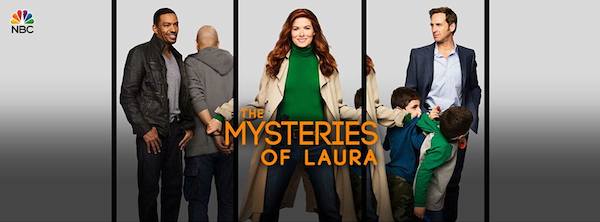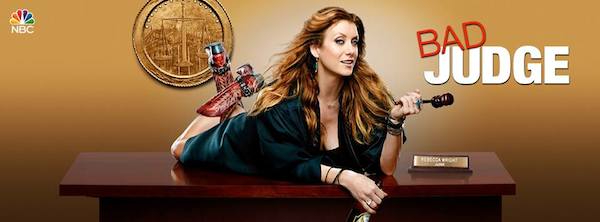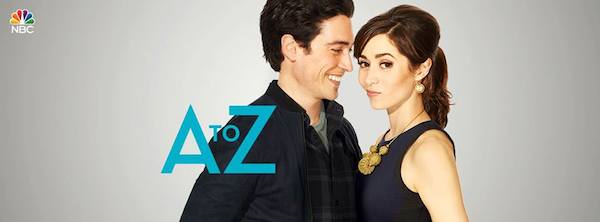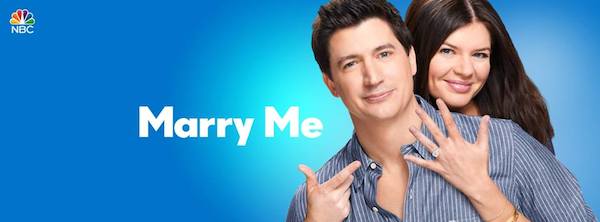Fall Premieres 2014: NBC
 The once-venerable, then-vulnerable NBC has become venerable again, at least by 2014’s standards: they come into the year at number one, and have a stable of returning shows that make it plausible they’ll stay there. The big questions for NBC are whether they will continue their shift in priorities: already abandoning half their Thursday comedy block, the occupants of the single hour—Bad Judge and A to Z—look vulnerable, with focus shifting to The Voice and the comedies and dramas that work to capitalize on its broad audience. It’s a strategy that will work in the short term, but it’s also a strategy that depends on The Voice’s stability, something that feels more uncertain than NBC would like to admit.
The once-venerable, then-vulnerable NBC has become venerable again, at least by 2014’s standards: they come into the year at number one, and have a stable of returning shows that make it plausible they’ll stay there. The big questions for NBC are whether they will continue their shift in priorities: already abandoning half their Thursday comedy block, the occupants of the single hour—Bad Judge and A to Z—look vulnerable, with focus shifting to The Voice and the comedies and dramas that work to capitalize on its broad audience. It’s a strategy that will work in the short term, but it’s also a strategy that depends on The Voice’s stability, something that feels more uncertain than NBC would like to admit.
~~
THE MYSTERIES OF LAURA [Premiered Sept 17, 2014]
Debra Messing stars in an hour-long comedy procedural about a mother of twin six-year old hellions who just also happens to be a great detective—the mystery is how she keeps it all together. Alternate title, per NPR’s Linda Holmes: MomCop, CopMom.
*
Melissa Click, University of Missouri
Mysteries of Laura aired on the heels of the America’s Got Talent series finale in a special timeslot to help draw attention to the new series, which will regularly air beginning September 24th at 8pmET/7pmCT. The dramedy, based upon the Spanish series of the same name, successfully drew in 10.2 million viewers, but I’m guessing most viewers won’t return for another episode. The series features Debra Messing (Will & Grace, The Starter Wife, Smash) as Laura, a talented NYPD homicide detective with an out-of-control home life.
Messing is a talented comedienne, but she’s not enough to make the show watchable—the show’s jokes come and go too quickly to encourage laughter (plus, they’re not funny), and the pilot didn’t focus sufficiently on the homicide to generate much mystery. Laura’s complicated life is so messy it stressed me out. Her estranged husband Jake (Josh Lewis) is a cheater and a horrible father, Laura’s twins are so out of control they are kicked out of preschool (and URINATE on each other), and any space surrounding Laura (her desk, her car, her home) is trashy and cluttered. Yet somehow Laura manages to get the bad guys AND solve the crimes. The only true mystery surrounding Laura is the number episodes that NBC will air before the series is cancelled.
*
Kelly Kessler, DePaul University
My decades long disdain for Debra Messing made me incredulous from the get-go, but I’m generally sold on a fine balance of gunplay and family melodrama. Add the twin angle and I was willing to take a leap of faith. That said, Laura falters on most fronts. The show wants to join the ranks of Cagney and Lacey, Rizzoli and Isles, and The Closer, all of which embraced cop drama, quirky characters, messy love lives, prying families, and a little bit of sexism. Although Laura goes through the paces, its hackneyed dialogue, awkward acting, and weak titular character land like a ton of bricks. The tone is set somewhat lighter than the aforementioned lady cop shows, but the humor falls flat and renders Laura naught but a hot mess (e.g. out-of-control mother, wishy-washy near divorcee, hostile co-worker). With trite lines like “solved another case Colombo,” “you’re a middle aged police woman just like on TV,” and “just a mother with a shiny badge, a loaded gun, and very little patience” it’s hard to make it through the show without wincing. Instead of reveling in a nice balance of humor, drama, and pathos, I was just embarrassed for everyone involved. Even a good actor like Enrico Colantoni (Just Shoot Me, Veronica Mars) seemed awkward and wooden, as if he knew something had gone awry. At the end of the day (or episode) Laura just doesn’t have the pizazz of a Brenda Lee Johnson and not even her seemingly feral twins can save the show. I suppose it’s possible that the series can work itself into something watchable, but the premiere episode hasn’t found that yet.
*
Nora Patterson, University of Wisconsin-Madison
Mystery #1: Why does NBC think Debra Messing should play a homicide detective? Mystery #2: Can’t successful women on TV ever seem to balance work and life? Mystery #3: Is there something Liz Lemonish about Laura? Messing wears dishelved clothes, eats anything she finds, and is constantly sparring with estranged husband Jake, as he undermines her authority and kisses her in rapey ways. She just told you she wants a divorce – why are you kissing her? Mystery #4: What idiot thought any of these jokes are funny? There was one nice moment where Laura is rushing to get her family ready for a preschool interview, because apparently those happen at home on a weeknight. Messing is in Spanx as she gets her children ready, and this moment captures an absurd and humanizing portrayal of single motherhood so absent from television. However, the charm is smashed as Laura literally makes her kids drink cough syrup so they will be quiet. This show is horrible. The pilot uses gay and racial stereotypes like they are going out of style. The plot is contrived, and the pacing seems uneven. And while Debra Messing’s amazing comic talents shine through, they are wasted on this uneven dramedy. It is no mystery that this show will be cancelled shortly.
~~~~~
BAD JUDGE [Premiered Oct 2, 2014]
Kate Walsh stars as a party-loving judge who lives the contradiction of being bad at living a healthy life but great at punishing those who break the law—I would tell you more, but it’s on its third showrunner, so other than this your guess is as good as anyone’s.
*
Phil Scepanski, Vassar College
A judge who should be officious is actually a libertine. This premise, while not groundbreaking, offers the framework for a potentially funny comedy. In fact, Bad Judge has a lot going for it. Star Kate Walsh has proven capable of playing comically world-weary characters well. Adam McKay (Anchorman, Stepbrothers) co-created and co-executive produces with Will Ferrell among others. Gary Sanchez Productions’ track record includes Eastbound and Down and Drunk History. The courtroom setting provides ample space for Ferrell and McKay to exploit the stable of Funny or Die talent as guest appearances.
Unfortunately, these elements did not translate to a strong first episode. Ostensibly the result of a tortured production history, it crams a lot of plotlines into the first episode. A grain of salt is appropriate here though, as this is fairly common to pilots and this one in particular is the result of mashing together multiple independent episodes. On the positive side, the central of Bad Judge‘s many plots proved at least moderately engaging. After having sent both his parents to prison, the judge acts as an offbeat but effective protector and mentor to a young boy. So the judge, who should be uncaring has a heart. That’s a workable angle. Plus, Chris Parnell and Horatio Sans turned in fairly strong guest performances.
The show suffers most in the sections trying to play up the “bad” angle of the show’s title. Alcoholism, casual sex, a sweet van, and a love for outdated music unconvincingly signify coolness. These aspects of the character’s life should be the source for Bad Judge‘s humor, but largely fall flat. A gag in which Walsh’s character says something embarrassing and attempts to cover it by claiming “This is Your Hickey” is a song seemed especially hackneyed to me.
Moving forward, Bad Judge might get its act together when the backstage issues settle down. I’ll give it some more chances. If you want to take the risk of joining me, just skip the pilot.
*
Matt Sienkiewicz, Boston College
I think I remember reading something about Man Ray watching ho-hum Hollywood films with his hands in front of his face, shifting his fingers to convert Technicolor melodramas into kaleidoscopes.
This wouldn’t work very well with Bad Judge, unless you’re into flat lighting and municipal colors.
I did, however, find the key to enjoying this pilot in a gentle twisting of the otherwise uninspiring text.
If you don’t do something, this a clunky, character-driven one-cam about a quirky justice based loosely on the judge in George’s Jerry pilot who sentences the guy to be Seinfeld’s butler. Also, if you let the show come to you, you have to deal with the bad judge’s patronizing, supposedly endearing and very Blind Side-y relationship with a precocious African-American kid whose parents she has convicted on something or other and feels bad for.
Ah, but what if the kid isn’t real? Watch closely. Doesn’t he just seems to appear out of nowhere in half the scenes? Who talks like that? Everyone else in the show keeps telling the supposedly bad judge to ignore phone calls that, from her perspective, pertain to the welfare of a child in need. Doesn’t add up does it? If he’s not real it does. Give it a shot.
So, if you insist on keeping your mental hands in your mental pockets, then Seinfeld’s always on somewhere, go for that. But if you’re intrigued by my probably apocryphal, certainly pretentious Man Ray metaphor then well, I had a good time.
~~~~~
A To Z [Premiered Oct 2, 2014]
Ben Feldman and Cristin Miloti play a couple who unexpectedly stumble into a relationship that might well be the product of fate, which the series’ frame narrative reveals may be more complicated than its alphabetical title would suggest.
*
Karen Petruska, University of California – Santa Barbara
I went into this program blind, not even knowing that Ginsberg from Mad Men is the male protagonist (fun surprise). But within the first thirty seconds of the show’s introductory voiceover (by Katey Sagal) that told us the program will relate the comprehensive eight-month long relationship of Andrew and Zelda, from A to Z, I worried I would hate this show. Sagal speaks in a clear cadence, relating a fairy-tale esque story of falling in love, with a bouncy, happy tune producing a sense of (annoying) whimsy.
Both leads are charming, and their push and pull between romanticism (Andrew) and cynicism (Zelda) provides needed tension. And yet…the show lacks edge. Whimsy, it seems, only works when paired with something dark (a la Bryan Fuller’s Pushing Daisies). There are hints of edge, as Andrew works at a dating site that now intentionally plots to keep its members from falling in love to maintain the site’s subscriber base, but the hints are not enough to balance the cliches.
Starring the actress who portrayed the long-rumored, much-desired, eventually-beloved, cruelly-killed Mother from How I Met Your Mother, it seems odd to me that A to Z, too, would begin with a gimmick as its hook. Because it seems this is a rom-com about a couple who DOES NOT make it to the altar. Portraying a “comprehensive” relationship of only eight months creates a show with a clock: when the clock runs out, the show—and the relationship—will be over. Why build a sitcom with a clock, unless you plan to violate the clock at some point? But even here, the program is vague—do they break up? A clearer answer might provide not only balance but also build trust in a fan base already burned in the past.
*
Jennifer Smith, University of Wisconsin – Madison
Though I was tempted to make the “A to Twee” pun that I’m sure others have already gotten to, cutesy affectations aren’t the problem with A to Z. The hipster and Manic Pixie Dream Girl elements aren’t my favorite stylistic choices, and they betray the show’s desperate desire to be 500 Days of Summer: The TV Show, but they aren’t inherently offensive. I can just shrug, admit the style isn’t for me, and let others enjoy it.
What I find harder to ignore is the inherent creepiness of the central relationship as introduced. Playing on time-worn “stalking is totally adorable” tropes that I’ve railed against elsewhere, the pilot presents Andrew as utterly disrespectful of Zelda’s boundaries, making insistent claims about their destined love based on fantasies he built around her before they ever spoke, then scouring the internet for photos of her to “prove” his correctness when she initially turns him down. Though I’m sure the showrunners don’t want us to directly link Andrew with Ben Feldman’s character on Mad Men, it honestly isn’t hard to imagine him giving Zelda his mutilated nipple in a box by the end of this series. “Run away!” I yelled at my screen, but of course Zelda didn’t; by the end of the episode, she was the one apologizing for doubting Andrew’s ravings, and I was the one banging my head into a wall.
This is a shame, because as a comedy, the pilot works quite well. I laughed out loud several times, and a number of extended jokes (the Baaeder-Meinhof Phenomenon, Lea Thompson’s cameo) stood out to me as being especially clever, well-delivered, and well-timed. But the romance part of this pilot is so distasteful that it fails as a romantic comedy, and I won’t be tuning in again.
~~~~~
MARRY ME [Premiered Oct 14, 2014]
Happy Endings creator David Caspe returns with another irreverent comedy, this one focused on a couple (Casey Wilson, Ken Marino) whose delayed engagement creates tension between them and their friends and family following a proposal mishap.
*
Nicholas Benson, University of Wisconsin – Madison
Annie (Casey Wilson) and Jake (Ken Marino) have been together for five years. When Jake finally decides to pop the big question, Annie has a major life crisis ruining the big moment. The show proceeds from there in an I Love Lucy inspired debacle- fest, as all of Annie’s attempts to fix the problem bring us deeper down a rabbit hole of awkwardness and mild hilarity. Wilson and Marino have great chemistry and when they’re together the show is on its strongest footing.
Ultimately, Marry Me is entertaining, well written, legitimately funny, and, as if all that weren’t enough, stars Tim Meadows as one half of a biracial gay couple (would we call that efficiently diverse?).
What I like about this show is not what it is now, but what it has the potential to be. It opens a space in prime time broadcast comedy to complicate the usual relationships we see on television. Instead of the early “will they or won’t they” stage or “the married for 20 years with kids” stage, this is something that could explore the middle stage where there are shades of grey, and room for more nuanced stories to be told.
Is Marry Me Woody Allen material? Not at all, but it’s as close as broadcast TV is getting right now.
*
Karen Petruska, University of California – Santa Barbara
Marry Me may end up being a fine show about two people who know each other very well, who accept each other’s flaws, and who struggle with the usual obstacles on their path to the altar. But the pilot is not good. Or perhaps, the pilot is not good if you are a female audience member looking for a show that refuses to traffic in the worst clichés about women.
Cause get this—our heroine is so desperate for a marriage proposal that she ruins the moment where he’s finally ready, when (the show suggests) she should have continued to wait patiently, trusting that he knew the right moment. All I could think about was why TV couples never discuss marriage? Why do they have zero context for the timeline of the other person? What is the illness in our culture that a marriage proposal can only be romantic if it is a surprise? Doesn’t that expectation automatically preclude valuable pre-engagement discussions of hopes, dreams, values, fears, and desires?
Clearly, I was watching the wrong show.
In a flashback scene, we witness our heroine accidentally implying that she loves her boyfriend, and then immediately becoming nervous that he has not yet said it first. And her awkwardness in that moment is what I am supposed to laugh at.
If this show were a bit wiser, these moments might be somewhat satirical, exposing odd inequalities that form foundational concepts for what = romance. Despite being a comedy, though, her anxieties are played straight, with her neuroses meant to be endearing. Marry Me is a sorry state on how TV executives view love and women in general. Considering it is written by the lead actress’ husband, I’m genuinely perplexed and plenty bummed that this show hasn’t offered more of value besides tired clichés and cheap jokes.
*
Jennifer Smith, University of Wisconsin – Madison
As someone who holds a lot of good will toward Ken Marino, who really deserves a steady TV paycheck to complement his talent, I had high hopes for Marry Me. Ultimately, though, this pilot is just all right. Its humor, particularly the opening sequence, relies heavily on audience dread of a character’s imminent humiliation, so those who, like me, have to watch scenes like that in cringe-mode while peeking through their fingers, should be forewarned. The jokes themselves are hit-or-miss, and sometimes oddly-delivered; female lead Casey Wilson has obvious talent and strong comedic timing, but she tends to substitute sheer volume for emotional expression. Luckily, the show makes up for middling humor with believable chemistry between the leads and a romantic plot that successfully walks the tightrope between sentimentality and believability. I found myself rooting for this couple, which is more than I could say for the couple on NBC’s other new rom-com, A to Z. And though this is, at its core, yet another show about a straight white couple, I appreciated that family and friendship were presented as just as valuable to the protagonists as romantic love, and that Wilson’s dad was raised by an interracial gay couple (even if the joke about which one is her bio-dad is even older than the first time I personally heard it, on Glee). Nothing stands out as particularly spectacular or particularly awful in this thoroughly mediocre pilot, but considering the poor quality of most sitcom pilots, that may be high praise. At the very least, I’m willing to stick around for a few more episodes to see if it improves.







Mysteries of Laura confirmed what Smash had already announced loud and clearly, that Debra Messing just can’t do drama. She can be funny, but only very bad when she tries to get serious. I have absolutely no ability to care about her characters, therefore. When she was taunting Enrico Colantoni to pull the trigger at the end of the show, therefore, I was hoping NBC execs thought the taunt was for them. Painfully bad.